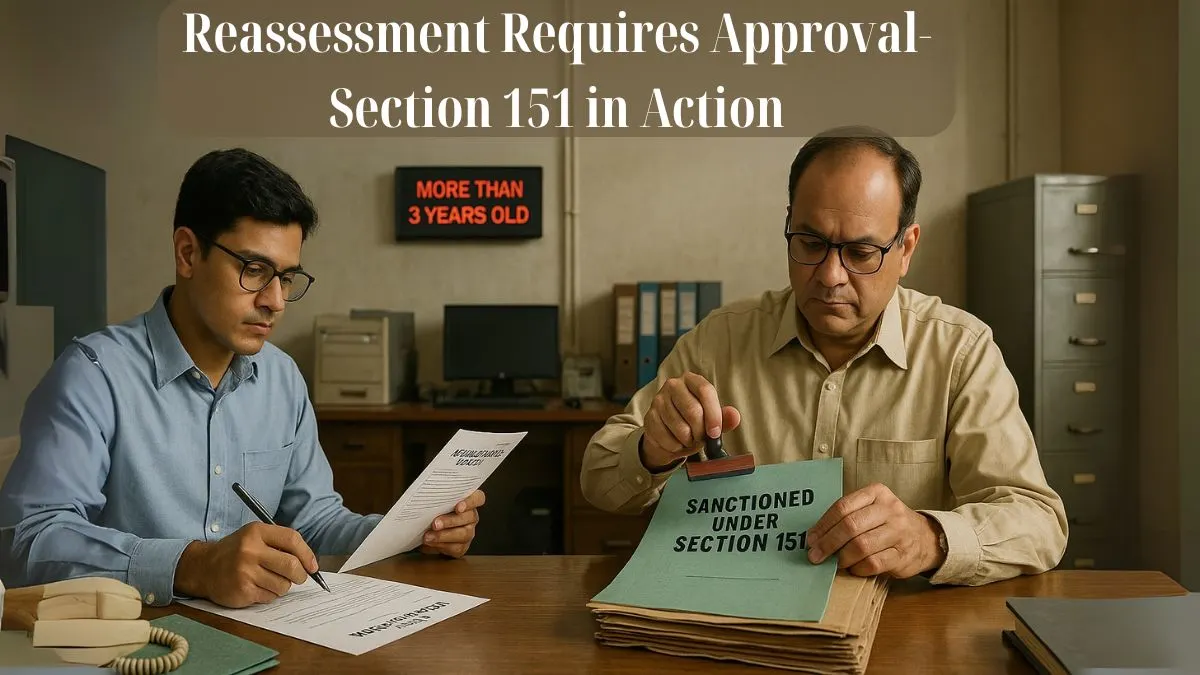
Most taxpayers panic when they receive a notice under Section 148, but few realise that the real authority behind this notice isn’t the officer who signed it. It’s Section 151 of the Income Tax Act that quietly pulls the strings.
This underrated section doesn’t just support the reassessment—it controls it. From determining whether prior approval was taken to assessing if the notice was even valid, Section 151 serves as a legal checkpoint designed to prevent misuse of reassessment powers.
What is Section 151 of the Income Tax Act?
Section 151 outlines the sanction for the issue of notice under Section 148. In simple words, before an Assessing Officer can reopen a past assessment or reassessment, they need approval from a higher authority, depending on the time elapsed.
This approval process acts as a check on the powers of Assessing Officers, ensuring that taxpayers are not subjected to arbitrary or unjustified reopening of cases.
How Section 151 Works in Practice
Here’s how the system functions under Section 151(1) & Section 151(2):
- If less than three years have passed from the end of the relevant assessment year, the Assessing Officer can issue a notice under Section 148, but approval from the specified authority is still required.
- If more than three years but less than ten years have passed, then the Principal Chief Commissioner, Chief Commissioner, Principal Commissioner, or Commissioner must approve the issue of notice.
This layered approval ensures that notices are issued only after careful review & consideration by senior officials."
Importance of Approval under Section 151 of the Income Tax Act
The need for approval under Section 151 of the Income Tax Act cannot be overstated. Without proper sanction, any notice issued under Section 148 becomes invalid. This is a critical defence point for taxpayers who wish to challenge the validity of such notices.
Several case laws on Section 151 of the Income Tax Act have shown that courts quash reassessment proceedings if it’s proven that the proper procedure or approval was not followed.
Why Is This Relevant to You?
Whether you're a salaried individual or a business owner, the reopening of old assessments can create anxiety & confusion. It’s important to know that no notice shall be issued under Section 148 by an Assessing Officer unless the required approval is obtained under Section 151.
The section acts as a power to call for information, but with limits. It helps protect taxpayers from unnecessary harassment & promotes accountability within the tax department.
Updates and Relevance of Section 151 in 2022 and Beyond
Recent amendments have made it even more important to & the scope of Section 151 of the Income Tax Act 2022 & its application today. The Finance Act has tightened rules around reopening cases & increased the scrutiny before allowing an officer to revisit an old file.
Also, references like section 151 of the Income Tax Act 2024, though future-dated, often point to the latest interpretation & application of the law. Staying updated helps you remain compliant & better prepared.
Subsections: 151(1) vs 151(2) of Income Tax Act
Many people confuse sections 151(1) & 151(2) of the Income Tax Act. Here’s a quick breakdown:
- Section 151(1) deals with notices beyond 3 years but within 10 years, requiring approval from higher authorities.
- Section 151(2) pertains to notices within 3 years, where the approval authority is comparatively lower.
Understanding this distinction is essential if you're trying to legally challenge or respond to a notice under Section 148."
Final Words
Whether you're facing scrutiny or just want to stay informed, Section 151 gives you the clarity & protection every taxpayer needs. It ensures that the process of reopening cases is fair, structured, & reviewed by higher authorities before you are pulled into litigation.
⚖️ Need professional help to respond to an income tax notice or challenge its legality?
Visit Callmyca.com now — where real experts break down real problems, so you don’t face the taxman alone.











